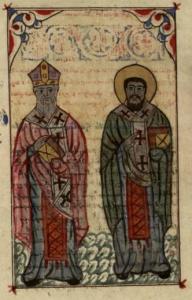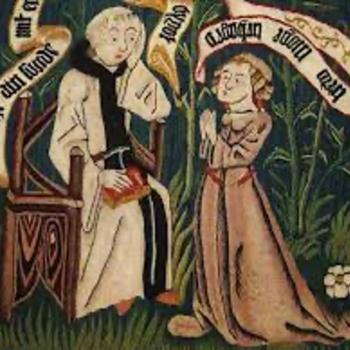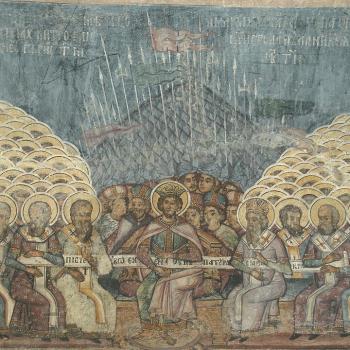Devotional literature is everywhere. It might be found on your grandma’s bookshelf, the catalogue of a Christian publisher, or the ‘religious book’ section in your local Walmart. While there might be disparity between the quality of certain devotionals, these works are meant to foster and encourage spiritual discipline, expand our understanding of the biblical text, or simply bring comfort amidst a challenging season.
While the format of most modern devotionals is unique, this practice is anything but. Christians have long read works such as John Climacus’ Ladder of Divine Ascent, Bernard of Clairvaux’s On Loving God, and Teresa of Avila’s The Interior Castle as a guide to loving and following God well, in light of the Scriptures. Even the Book of Common Prayer, though made up primarily of different Bible passages, teaches careful readers how to orient their lives to God through the ordering of texts, the provided prayers, and collects for a given season.
Reading Ancients Devotionally
In my own life, the most beneficial devotional resources for my spiritual growth have been ancient ones, works composed in prayer and spiritual discipline by our church fathers and mothers. In this, I typically try to follow the church calendar in some capacity, reading a work that is relevant to that liturgical season. So, in Christmastide I have read Athanasius’ On the Incarnation; during Easter I often meditate on Melito of Sardis’ On Pascha; in Pentecost, I have engaged with On the Holy Spirit by Didymus the Blind. If you are considering what to read and contemplate during this advent season, I might humbly suggest that you consider reading a voice from the early church.
In my own reading this advent season, I came across an insightful passage by Cyril of Jerusalem, which might be stimulating to you all. Cyril was bishop of the important city of Jerusalem from around 350 to 386, a turbulent time in Christian theology and doctrine. While he was embroiled in theological and ecclesiastical controversy, for which he was exiled three times, his authority and orthodoxy were confirmed at the famous ecumenical council of Constantinople in 381. In all of this, he is primarily described as a preacher and liturgist by ancient and modern Christians alike.

The work under consideration is contained in Cyril’s famous catechetical lectures. These lectures were delivered before and after a person’s conversion to Christianity, as a means to help them enter into the mysteries of God: “Especially, having been made worthy of the divine and life-giving baptism, you have been made fit for the divine mysteries” (Cyril, Mystagogical Catecheses I.1). It is in this context that we see Cyril’s discussion of advent, in ways that are strikingly different than most of our modern ones. He writes:
We preach not one coming of Christ, but a second as well, far more glorious than the first. The first gave us a spectacle of His patience; the second will bring with it the crown of the Kingdom of God. In general all things are twofold in our Lord Jesus Christ. His birth is twofold, one of God before the ages, and one of a virgin in the consummation of the ages. His descent is twofold, one lowly, “like the rain upon the fleece” (Ps 71:6), and a second, His manifest coming, which is yet to be. In His first coming He was wrapped in swaddling clothes in the manger; in His second He will be “robed in light as with a cloak” (Ps 103:2). In His first coming He “endured a cross, despising shame” (Heb 12:3); in His second He will come in glory, attended by a host of angels. We do not rest, therefore, in His first coming, but we look also for His second. Just as we said of His first coming: “Blessed is he who comes in the name of the Lord” (Matt 21:9), so we shall repeat the same at His second coming, saying with the angels in adoration, as we meet our Master: “Blessed is he who comes in the name of the Lord.” The Savior will come this time, not to be judged, but to judge those who then judged Him. He who then was silent before His judges will remind those wicked men of their cruelty at the Cross, and say: “Such and such you did, and I was silent” (Ps 49:21) Then He came by divine condescension, seeking to win men by His teaching; but this time they will of necessity, whether they will or no, submit to Him as King (Cyril of Jerusalem, Catechesis XV.1).
Twofold Coming
The Latin word, from which our term ‘advent’ is derived, is adventus: coming or arrival. While modern Christians have focused most of their attention on Christ’s first coming, Cyril and other ancient Christians acknowledge the twofold nature of Christ’s coming. He came and will come again. This marries our awe and wonder of God’s salvific plan for creation, seen in Christ’s birth in Bethlehem that first Christmas, with an urgency to repent, to look forward to his glorious return. This coming advent of glory, adventus glorificamus, grounds our hope for justice, renewal, and resurrection. Tish Harrison Warren summarizes, in her delightful little book on advent, “Advent, ultimately, is a season of hope, which is why it is mostly about Christ coming in glory. This is the truest object of our hope. We celebrate that Jesus came in his incarnation and find comfort in how he comes to us in our daily lives, but all of our longings meet their end in Christ coming again, bringing healing, peace, joy, and an imaginable wholeness in his wake” (Tish Harrison Warren, Advent: The Season of Hope, 20-1). Christ came in humble cloths but will come again in glory, making all things new (Rev 21:5).
Ancient Devotional Resources
I am aware that it can be challenging to know where to find this sort of literature, especially for the uninitiated. The works listed above might be of interest to you, and I can recommend anything in the Popular Patristic Series from St. Vladimir’s Seminary Press. They have published dozens of accessible and cheap translations of important texts from the early church, many of which have a pastoral orientation. The Ancient Christian Commentary on Scripture series is also excellent, if you wish to explore how figures from the early church interpreted certain biblical passages. Finally, the CSB Ancient Faith Study Bible has selections from the Ancient Christian Commentary on Scripture in the study notes, making some of these readings available without buying separate commentaries. In any case, there is a great need for devotionals which make the insights of early church writers more accessible to modern audiences.













